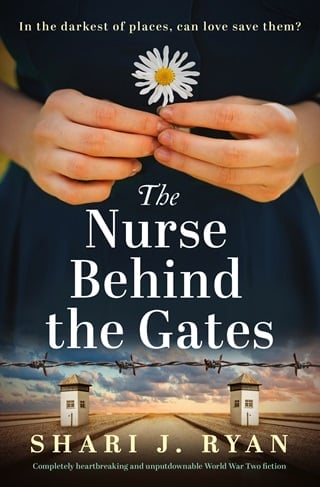Chapter 1
The first morning of a new month feels as if it deserves recognition; it’s a new start we’re fortunate enough to experience twelve times a year. Yet, no one ever says much about it because life revolves like a wheel—spinning until it hits a hill or loses momentum.
My eyes tire as I stare at a calendar, one I’ve carefully drawn up on a piece of typewriting paper by tracing lines along the edge of my schoolbook. My teacher taught us about the importance of tracking dates—she says it helps us keep our minds moving in a productive direction. This will be the third month I’ve attempted to do this, but the last two months only show red x’s through each day’s box. I would prefer to be busy. Without any plans in the foreseeable future, I’m not sure I see the point of keeping track. I can’t even count down the days until the war ends.
Still, the empty squares encourage me to add an event or something special I shouldn’t forget. Tomorrow is Friday, and Shabbat, or it should be for us. We don’t speak much about the holiday in our house, never mind celebrating as we had for as long as I can remember, but it belongs on the calendar.
My hand is unsteady as I write each letter across tomorrow’s box. The curves and lines of my handwriting have ridged edges, proving the everlasting nerves I endure. Shabbat deserves to be noted. Maybe if my parents were to write it down, they too would reconsider how we tend to our practices.
I pull open the drawer of my rickety writing desk and drop my pencil on top of the others, but I can’t hear the rattling clunk above the loud chatter growing downstairs from what sounds like several men. I wasn’t aware we were expecting company, especially this early in the day.
Papa’s voice isn’t the loudest, not like it normally is. He would argue that it’s not that he has a more powerful volume than anyone else, it’s that he has a uniquely baritone sound, like rumbles of thunder.
I take my robe from the edge of my hand-carved four-poster bed and pull the warm material over my shoulders. With a slight twist of the doorknob, I tug the door open just enough to fit through, then follow the muddy-brown floor panels from my bedroom that flow into the hallway, which lead to an oak stairwell. The railing, though clean, always feels sticky from whatever varnish was used during the latest round of minor renovations to our eighteenth-century farmhouse. Although the last updates were completed well before I was born, this house has been passed down from generation to generation on my mother’s side of the family—originally built by my great-great-grandfather.
The first flight of stairs complains with creaking groans that could give away my footsteps, but rusty-red tiles cover the second stairwell. I could run up and down those steps all day and no one would hear a peep. In fact, there have been many times where I’ve been able to hide behind the curve of the white-stucco wall and listen to conversations carrying on in the foyer, perhaps ones I shouldn’t always be privy to—but I’d rather know than be left in the dark.
I’m still in my lime-green evening pajamas and my long, unruly auburn hair is in knots, but I must know more about what’s happening just a few steps away.
“You must understand, I can’t abandon my patients per your say-so, gentlemen.” There is a change in my father’s voice. It may be because he’s speaking in German rather than Polish, but we are all quite fluent, or so we’ve become over the last couple of years since Germany took over our country. We still speak Polish among ourselves and the other locals in town. I don’t see why we should change the way we talk because the Germans don’t feel the need to speak our language. “As the primary physician here in O?wi?cim, I have a commitment to the folks in this town. They depend on me.”
The pause in discussion feels minutes long even though only a few seconds pass before one of the other men responds.
“Herr Amsler, certainly, you must know we will make it worth your trouble. You are, indeed, the best physician around, and we need a man with your skills. You would be doing your family and country a great service, as well.”
Our country—a confusing term since the Germans have overruled Poland and taken it as their own. Papa is not in the Polish Army, and definitely not a part of the German Army. Therefore, I’m not sure what more he could do to help Poland than being of aid to the residents here.
“I understand quite well, but I insist you allow me time to speak to my wife before offering you an answer.”
Papa would never consider leaving—or worse, closing his practice—the one I planned to join after nursing school—for whatever these men are offering him. I’m sure he’s saying what he must to make them leave.
“Of course, Herr Amsler. We will return tomorrow morning for your answer. Please tell your wife and daughter we send our best. Take care. Have yourself a pleasant day.”
Foolish men. It’s quite clear there isn’t such a thing as a “pleasant day” in Nazi-occupied Poland.
“Will do, gentlemen,” Papa replies. “Allow me to get the door for you.”
The front door closes with a deafening thud, cueing me to continue down the steps, where I find Papa gripping the doorknob and staring at the door as if he could see through the thick wood.
“Papa, is everything all right?” I ask, keeping my voice low so I don’t startle him.
His shoulders slouch forward before he turns to face me. He’s already dressed for work in his tweed brown dress pants, white button-down shirt, and favorite maroon tie with small white polka-dots. But there is sadness in his eyes and a crease between his eyebrows—not the way he typically appears before leaving in the mornings.
“How much did you overhear, Sofia?”
“Enough to make me wonder why there were men in our house so early in the morning, especially men who were asking you to give up your practice for ‘our’ country.”
“It’s complicated, ma?y myszka,” he says, placing his hand down on my shoulder. He hasn’t called me “little mouse” in years. I’m sixteen now, nearly a grown woman.
“Who were they?” I press.
“No one I want you to be concerned with, but I must go talk with your matka. Go on and get yourself ready for school so you aren’t late.” Whatever he must talk to Mama about, it will not be a pleasant conversation.
My stomach churns with apprehension. Papa hardly ever shows his nerves, never through his expression, which declares a state of fear now. He will likely take the conversation into their bedroom, where he knows I can’t overhear them. Their large closet sits between my bedroom and theirs, blocking out all sound.
He’s already halfway up the first stairwell when I make my way to the front door, wondering if the men are still outside. The narrow glass window alongside the door is foggy, so I rub my elbow in a small circle, spotting two men in gray uniforms, complete with knee-high shined black boots and tilted head-caps. They aren’t just men from one of the Armed Forces; I can see they are of a higher importance, especially by the looks of the Mercedes they are stepping into. We avoid men in uniform at all costs around here. It’s something we’ve done since they moved into our country over a year and a half ago.
The car loops around and kicks up dirt upon leaving our property. I didn’t realize how long I have been staring out the window at the men, but sometimes I feel like it’s the only way I can catch a glimpse of the truths these walls protect me from.
The conversation between my parents must not be going well as I hear their door open and close with force.
“Sofia, where are you?” my mother calls out.
I head up the steps, being quick about it as it sounds like Mama might be in my bedroom waiting for me. My heart pounds as I mount the top step, facing my room.
“I’m here,” I say, finding her hovering over my desk and scrutinizing my calendar.
“What is this?” She points down to the one box I wrote in.
“Shabbat—it’s tomorrow night and I thought?—”
Mama lifts the piece of paper from my desk as if she’s holding a document that could dictate our fate. Her eyes widen and her bottom lip falls ajar. “No, no, no.” She tears the paper into pieces, over and over until the scraps float to the floor, creating a mountain of snow. Mama sweeps her short auburn hair behind her ears, showcasing the pink tinge of her cheeks. “There is no more Shabbat. We’ve been over this.” She says so with her teeth gritted.
“I don’t understand why it matters what we do in our house?” I question her.
Mama’s sharply shaped brows knit together, and her head falls to a slight angle. She’s looking at me like I’m guilty of a sin. “You know why it matters. Your father is not Jewish like we are, and it’s not right that we force him to celebrate a holiday of our faith.”
Someone might as well sock me in the stomach because I feel winded, and all I can do is stare down at the pieces of shredded paper between us. “We’ve lost all of our rights. I must have forgotten,” I say, folding my arms over my chest as if she deserves my aggravation. She doesn’t.
“You did not forget,” Mama snaps. She takes my hand between hers and squeezes tightly. “You are angry, Sofia, and rightfully so, but for now, we must forget who we are and stand behind your father. Believe me when I tell you, we have not lost all of our rights, and we should be grateful.”
When I look up at Mama’s face in search of empathy, I notice tears forming at the corners of her red-stained eyes and she lifts my fist to her lips, giving me a kiss. “Why are you angry with him then?” I ask.
She shakes her head and releases a lungful of air. “Your father is not who I’m angry with. I, too, resent the world we are living in, and there is nothing I can do except comply for our safety.”
Denial is like a glass wall, easy to see beyond, but impossible to walk through. If I give into the fear, it will consume me. Therefore, I must continue to focus on the present.
Because we are safe. For now.
 Fullepub
Fullepub 



